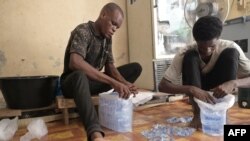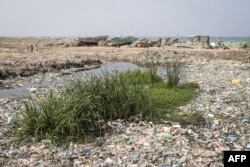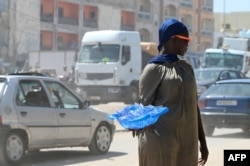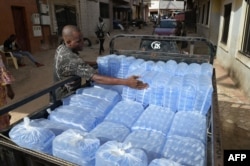Moussa Ndoye, a 28-year-old beachgoer in Senegal's capital Dakar, gulps down the water from two plastic sachets in quick succession and throws them in the sand.
"This is our rubbish bin," he says with a laugh, sitting with friends in the shade of a large wooden fishing boat.
The white sand shore is littered with plastic waste, including discarded transparent pocket-sized drinking water sachets.
Practical, easily purchased in shops or from street hawkers, and cheaper than water bottles, the sachets are integral to everyday life in Senegal.
But they are a key contributor to plastic waste marring the West African nation's streets and coastlines.
Water sachets take 400 years to decompose into microplastics, according to Adams Tidjanis, professor of environmental studies at a private university in Dakar.
In Senegal, more than 250,000 metric tons of plastic are discarded each year, while only about 30,000 tons are recycled, according to a 2022 report by the Ministry of Urban Planning.
"There are a lot of them on the beaches, they're part of the plastic waste we see the most," says Pape Diop, head of an environmental protection association.
Previously, "fishermen took cans (of water) to sea, but now they use sachets of water, drink them, then throw them away — this waste all end up here (on the beach) because the sea rejects it," he adds.
Plastic pollution
In addition to polluting the water, the sachets obstruct drains, contributing to urban flooding.
They are often burned with other trash, releasing toxins into the air.
In Dakar, they litter sports fields, construction sites and busy intersections.
They are particularly noticeable during the hot season, which runs from June to October.
It is a phenomenon seen across much of the continent, with water sachets common in Nigeria, Ivory Coast and Burkina Faso.
They are outlawed in Kenya and Rwanda under bans on single-use plastics dating back to 2017 and 2019, respectively.
Senegal passed similar single-use plastics legislation in 2020, supplementing a 2015 law.
But exceptions were made for the sachets and other types of plastics in light of the COVID-19 pandemic, which severely affected people who live from day to day.
"Our socio-economic realities do not allow us to move towards their total ban," explains Khadidjatou Drame, who runs legal affairs at the environment ministry.
Around 50 brands compete for Dakar's water sachet market. They sell the sachets individually or in batches of 30.
The 400 ml sachets fetch 50 CFA francs ($0.08) on the street. For 250 ml sachets, it's 25 CFA francs.
Health concerns
Amadou Diallo, 63, launched the "Debeya" brand in 2017.
In his small factory in the Dakar suburb of Guediawaye, tap water passes through three blue tubes containing cotton, thread and coal to purify it.
The water flows on through two 1,000-liter tanks and then into a packaging machine that fills the sachets, seals them and places them in a blue basin.
Diallo says he produces 9,000 to 12,000 sachets per day during the hot season.
Getting started does not cost much — a cubic meter of tap water costs 202 CFA francs.
All producers are meant to have government authorization in order to operate — but many fail to follow hygiene rules, according to Mbaye Loum, head of the health ministry's National Hygiene Service.
Many customers told AFP they wonder about the source of the water they drink.
"We can't even count" how many rivals operate clandestinely, admits Diallo, whose operation is authorized.
"They set up their factories behind closed doors and you wouldn't even suspect that water is produced (inside)."







